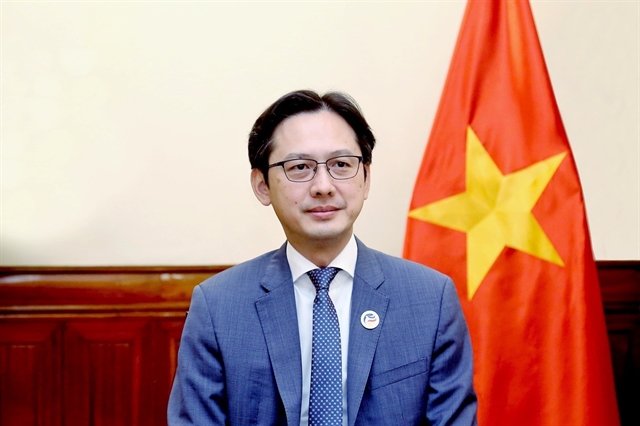 Politics & Law
Politics & Law

 |
| Deputy Minister of Foreign Affairs Đỗ Hùng Việt. — VNA/VNS Photo |
HÀ NỘI — Deputy Minister of Foreign Affairs Đỗ Hùng Việt lauded the success of the ASEAN Foreign Ministers' Retreat in Langkawi, Malaysia, on Sunday, under Malaysia's 2025 ASEAN Chairmanship, emphasising Việt Nam’s active contributions to the event’s key achievements, including fostering consensus on pivotal regional and global issues.
Việt, who also leads Việt Nam's delegation to the ASEAN Senior Officials’ Meeting (SOM), noted that the foreign ministers held comprehensive discussions on various issues, reaching consensus on several critical points. These results can be summarised in three key outcomes.
The first is the launch of a dynamic year of ASEAN cooperation.
As the inaugural activity for ASEAN Foreign Ministers during Malaysia’s tenure as ASEAN Chair, the retreat outlined strategic directions, priorities and initiatives under the theme of “Inclusivity and Sustainability.” In the political and security sphere, ASEAN reaffirmed its commitment to strengthening the bloc’s central role by fostering strategic trust through dialogue, diplomacy and goodwill. Furthermore, the bloc aims to deepen substantive and effective partnerships with external partners and regional organisations.
Economic cooperation will prioritise sustainable and inclusive growth by advancing regional integration, increasing trade and investment, implementing the upgraded ASEAN Trade in Goods Agreement (ATIGA) 3.0 and negotiating the ASEAN Digital Economy Framework Agreement (DEFA). Meanwhile, socio-cultural initiatives will emphasise inclusivity and sustainability, aiming to leave no one behind, reduce development gaps and address the impacts of climate change.
These priorities build on ASEAN’s past achievements, including Laos’ 2024 Chairmanship under the theme “Enhancing Connectivity and Resilience.” Initiatives such as digital economy development, carbon neutrality and SME advancement have been refined to reflect ASEAN’s proactive and flexible approach to evolving global challenges.
The second outcome is the groundwork laid for ASEAN’s long-term development.
The year 2025 marks a decade of ASEAN Community building and a critical juncture for preparing the bloc’s next developmental phase. Member states are reviewing the past decade’s progress while finalising the ASEAN Community Vision 2045 and strategic plans in political, security, economic, socio-cultural and connectivity domains to be implemented from 2026. This forward-looking approach addresses current needs while reinforcing ASEAN’s commitment to building a creative, resilient and dynamic community centred on its people.
Lastly, the retreat reaffirmed ASEAN’s unity amid global uncertainties.
Against the backdrop of complex international and regional developments, the meeting facilitated candid discussions on shared concerns. Key topics included major power competition, the East Sea (known internationally as the South China Sea), Myanmar, conflicts in Ukraine and the Middle East, and progress on the Declaration on the Conduct of Parties in the South China Sea (DOC) and the Code of Conduct (COC).
While acknowledging individual perspectives, member states unanimously underscored the importance of maintaining unity and strengthening ASEAN’s centrality in promoting peace, stability and prosperity. The bloc also agreed to deepen and expand equitable, effective cooperation with external partners.
These outcomes establish a strong foundation for ASEAN to continue its role as a growth driver and a vital contributor to regional peace, security and collaboration.
Việt Nam’s contributions
At the retreat, Deputy Minister of Foreign Affairs Đỗ Hùng Việt emphasised Việt Nam’s proactive, creative and constructive participation under the leadership of Deputy Prime Minister and Minister of Foreign Affairs Bùi Thanh Sơn.
Deputy Prime Minister Bùi Thanh Sơn reaffirmed Việt Nam’s strong support for Malaysia’s ASEAN Chairmanship and the 2025 theme, pledging close cooperation to effectively implement the bloc’s priorities. He underscored the importance of maintaining unity and strategic autonomy in the face of global challenges.
His proposals centred on enhancing regional economic integration, leveraging technological advancements for growth and fostering a people-centred, inclusive community. Sơn also reiterated Việt Nam’s commitment to supporting Timor-Leste’s path to full ASEAN membership.
Việt Nam will host the ASEAN Future Forum 2025 in Hà Nội in February, focusing on building a resilient and inclusive community amidst a changing global landscape.
In terms of cooperation with external partners, the Deputy Prime Minister highlighted the need for substantive, mutually beneficial relationships. As coordinator for ASEAN-UK and ASEAN-New Zealand relations (2024-2027), Việt Nam is actively preparing for milestone events, including the ASEAN-New Zealand 50th Anniversary Summit, which aims to elevate strategic partnerships and advance collaboration.
Sơn also provided candid and balanced assessments on pressing international and regional concerns. Regarding the East Sea (or South China Sea), he reaffirmed the necessity of maintaining ASEAN unity, adhering to international law and advancing the effective implementation of the DOC and substantive negotiations on the COC. He pledged Việt Nam’s cooperation with the ASEAN Chair and Special Envoy on Myanmar to strengthen the implementation of ASEAN’s Five-Point Consensus and to promote dialogue and reconciliation efforts.
Việt Nam’s active and constructive contributions were widely acknowledged and praised, reflecting its steadfast commitment to multilateral diplomacy. As ASEAN celebrates the 30th anniversary of Việt Nam’s membership in 2025, the country’s engagement further underscores its pivotal role in the bloc’s collaborative efforts and development. — VNS




